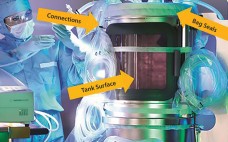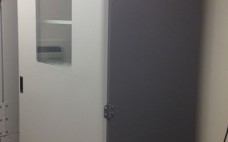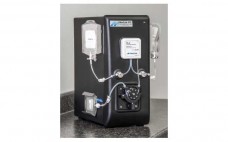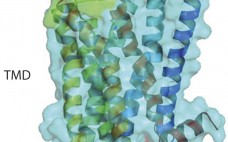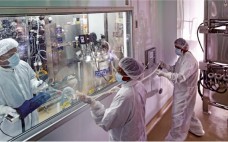Single-use technology is well accepted today, and manufacturers’ quality assurance programs ensure leak-free single-use bags upon delivery. But what about risks involved with installation and other handling errors? Operator training and implementation of suitable standard operating procedures (SOPs) are mandatory, but should they be the only ways to mitigate the risk of failures? In addition, more companies are advocating the use of ballroom concepts (1) for the manufacture of biopharmaceutical drug substances and drug products. However, how do you prove…
Upstream Processing
A Novel Solid-Media E. coli Platform: Comparison with Standard Fermentation Processes
MicroProtein Technologies Inc. has developed the MPTxpress high-yield, low‑cost, recombinant Escherichia coli manufacturing platform. Rather than using liquid culture media within stirred bioreactors, the system uses trays filled with semisolid (gelled) culture media overlaid with or without a permeable membrane on which the E. coli is cultured. Compared with conventional liquid fermentation platforms, the MPTxpress system reduces the number of steps in up- and downstream processing and required infrastructure, significantly improves yields, and lowers costs. It provides simplicity for mixing…
Defining Non-Animal Derived Supplements for the Optimization of Mammalian Cell Culture Media Using DoE Methodologies
Optimization of chemically defined animal-derived component free media to culture mammalian cells and optimization of existing commercial media is possible with their supplementation with specific additives.
Use and Optimization of Chemically Defined Media Supplements in Mammalian Cell Culture Processes
The manufacture of biological therapeutics requires a recombinant cell line, a media system and process to produce the therapeutic, and a purification process. BD Advanced Bioprocessing specializes in the media system to produce the therapeutic, including cell culture media and a variety of different types of supplementation.There are many types of supplementation, from animal-origin and animal-free hydrolysates to chemically defined, and each biopharma needs to find the best supplementation for their systems’ requirements.
Chemically defined media supplementation has many benefits such as lot-to-lot consistency and reduction/elimination of the risk of animal-origin materials. However, to get optimal performance these supplements are not always as forgiving as a full-bodied hydrolysate.
This webinar will use the newly commercialized BD CD Resurge™ supplements as a case example on how to use and optimize CD supplements in mammalian cell culture processes.
Flow Electroporation for Vaccine Development and Production: From Subunit Vaccines to Ex Vivo Immunotherapy
MaxCyte flow electroporation is a universal, clinically validated transient transfection platform for rapid, high-quality cell transfection in the development and production of vaccines and cellular immunotherapies.
Targeting G Protein–Coupled Receptors with Biologics for Therapeutic Use, Part 1
G -protein coupled receptors (GPCRs) represent a target superfamily linked to many disorders across all therapeutic areas. Although this target class has been historically treated by small molecules and peptides, antibodies can offer a number of advantages over such molecules by virtue of their specificity, dosing frequency, and restricted penetration. They also can provide other functional effects specifically mediated by the Fc region (ADCC and CDC) as well as different modalities such as those offered by bispecific and antibody drug…
Qualification of Scale-Down Bioreactors: Validation of Process Changes in Commercial Production of Animal-Cell-Derived Products, Part 2 — Application
Here we apply our approach to validation of animal cell culture process changes using qualified, scale-down bioreactors. As described in Part 1 (including Table 1, Figures 1 and 2, and References 1–23), the goal is to facilitate implementation for the benefit of both the patients and industry. “Qualification of Scale-Down Bioreactors: Validation of Process Changes in Commercial Production of Animal-Cell–Derived Products, Part 1 — Concept” appears on pages 38–45 of BioProcess International’s May 2014 issue. Process changes often entail validation,…
One Billion Mesenchymal Stem Cells in an Eppendorf BioBLU 5c Single-Use Bioreactor at 3.75-L Scale
For BPI’s inaugural “Ask the Expert” webcast, Ma Sha (Eppendorf’s director of technical applications) fielded questions related to his upcoming poster presentation at IBC’s Single-Use Applications for Biopharmaceutical Manufacturing in Boston this month: “One Billion Mesenchymal Stem Cells in Eppendorf BioBLU 5c Single-Use Bioreactor 3.75-L Scale”. Eppendorf R&D Labs is formerly New Brunswick Scientific, which was acquired by Eppendorf in 2007. Sha’s Presentation Our focus recently had been large-scale stem-cell applications in bioreactors. We chose to work on mesenchymal stem…
Qualification of Scale-Down Bioreactors: Validation of Process Changes in Commercial Production of Animal-Cell-Derived Products, Part 1 — Concept
Implementing continuous process improvements is increasing in priority for the biopharmaceutical industry. Such implementation can be driven by product safety, purity, and stability enhancement opportunities as well as by cost-reduction pressures. Companies invest in projects to improve product quality assurance, safety, and yield as well as production efficiency (1). Such changes may come at any process stage, from early cell-growth methods through final-product packaging improvements. Examples include growth medium optimization, purification column operation optimization, and enhanced recovery during final filling…
Cell Therapy Will Transform the Future of Medicine
The third annual IBC Cell Therapy Bioprocessing conference was held in Bethesda, MD, on 21–22 October 2013. It brought pioneers in the development of cell-based therapies together with companies that have enabling technologies, such as bioreactors, cell culture media, and advanced monitoring software. After the conference, I discussed the highlights and key themes coming out of the event with Dr. Phil Vanek, general manager of cell bioprocessing at GE Healthcare Life Sciences in Westborough, MA. Also an instructor for advanced…

